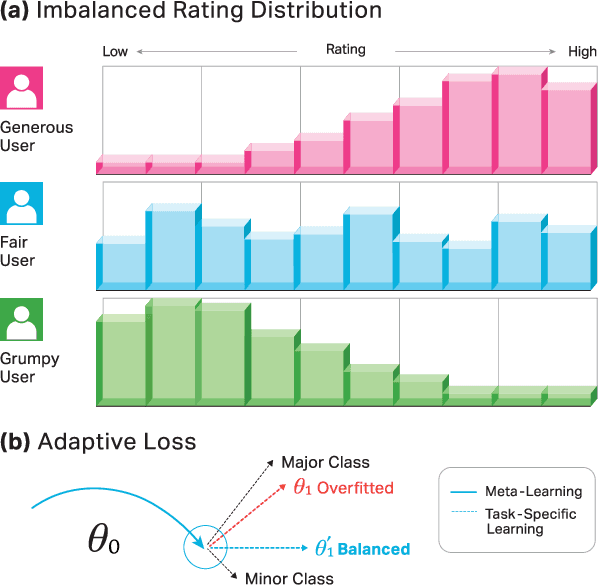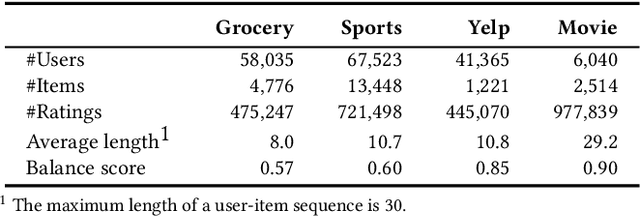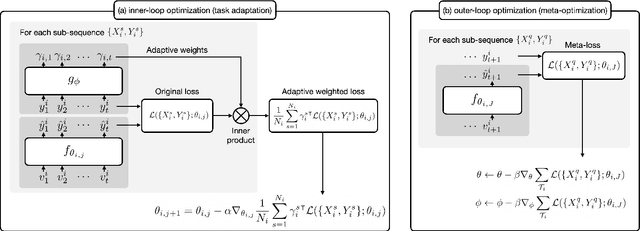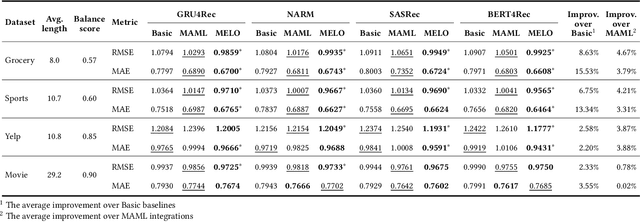Jung Hyun Ryu
AdaptiveRec: Adaptively Construct Pairs for Contrastive Learning in Sequential Recommendation
Jul 07, 2023Abstract:This paper presents a solution to the challenges faced by contrastive learning in sequential recommendation systems. In particular, it addresses the issue of false negative, which limits the effectiveness of recommendation algorithms. By introducing an advanced approach to contrastive learning, the proposed method improves the quality of item embeddings and mitigates the problem of falsely categorizing similar instances as dissimilar. Experimental results demonstrate performance enhancements compared to existing systems. The flexibility and applicability of the proposed approach across various recommendation scenarios further highlight its value in enhancing sequential recommendation systems.
Fisher-Weighted Merge of Contrastive Learning Models in Sequential Recommendation
Jul 05, 2023Abstract:Along with the exponential growth of online platforms and services, recommendation systems have become essential for identifying relevant items based on user preferences. The domain of sequential recommendation aims to capture evolving user preferences over time. To address dynamic preference, various contrastive learning methods have been proposed to target data sparsity, a challenge in recommendation systems due to the limited user-item interactions. In this paper, we are the first to apply the Fisher-Merging method to Sequential Recommendation, addressing and resolving practical challenges associated with it. This approach ensures robust fine-tuning by merging the parameters of multiple models, resulting in improved overall performance. Through extensive experiments, we demonstrate the effectiveness of our proposed methods, highlighting their potential to advance the state-of-the-art in sequential learning and recommendation systems.
AnomalyBERT: Self-Supervised Transformer for Time Series Anomaly Detection using Data Degradation Scheme
May 08, 2023Abstract:Mechanical defects in real situations affect observation values and cause abnormalities in multivariate time series, such as sensor values or network data. To perceive abnormalities in such data, it is crucial to understand the temporal context and interrelation between variables simultaneously. The anomaly detection task for time series, especially for unlabeled data, has been a challenging problem, and we address it by applying a suitable data degradation scheme to self-supervised model training. We define four types of synthetic outliers and propose the degradation scheme in which a portion of input data is replaced with one of the synthetic outliers. Inspired by the self-attention mechanism, we design a Transformer-based architecture to recognize the temporal context and detect unnatural sequences with high efficiency. Our model converts multivariate data points into temporal representations with relative position bias and yields anomaly scores from these representations. Our method, AnomalyBERT, shows a great capability of detecting anomalies contained in complex time series and surpasses previous state-of-the-art methods on five real-world benchmarks. Our code is available at https://github.com/Jhryu30/AnomalyBERT.
Meta-Learning with Adaptive Weighted Loss for Imbalanced Cold-Start Recommendation
Feb 28, 2023



Abstract:Sequential recommenders have made great strides in capturing a user's preferences. Nevertheless, the cold-start recommendation remains a fundamental challenge in which only a few user-item interactions are available for personalization. Gradient-based meta-learning approaches have recently emerged in the sequential recommendation field due to their fast adaptation and easy-to-integrate abilities. The meta-learning algorithms formulate the cold-start recommendation as a few-shot learning problem, where each user is represented as a task to be adapted. However, while meta-learning algorithms generally assume that task-wise samples are evenly distributed over classes or values, user-item interactions are not that way in real-world applications (e.g., watching favorite videos multiple times, leaving only good ratings and no bad ones). As a result, in the real-world, imbalanced user feedback that accounts for most task training data may dominate the user adaptation and prevent meta-learning algorithms from learning meaningful meta-knowledge for personalized recommendations. To alleviate this limitation, we propose a novel sequential recommendation framework based on gradient-based meta-learning that captures the imbalance of each user's rating distribution and accordingly computes adaptive loss for user-specific learning. It is the first work to tackle the impact of imbalanced ratings in cold-start sequential recommendation scenarios. We design adaptive weighted loss and improve the existing meta-learning algorithms for state-of-the-art sequential recommendation methods. Extensive experiments conducted on real-world datasets demonstrate the effectiveness of our framework.
 Add to Chrome
Add to Chrome Add to Firefox
Add to Firefox Add to Edge
Add to Edge